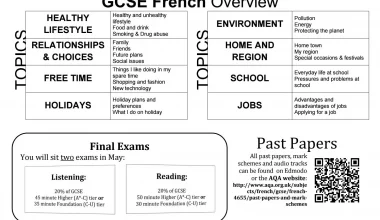GCSE exams are significant process for every student in the UK. It’s the major test of knowledge and academic potentials for every student who has completed their secondary school education, and desire to go further. The question is are some GCSE Subjects harder than others?
Most students consider GCSE subjects hard; with a vast amount of materials to study, and the overwhelming feeling about the sheer number of GCSEs you need to take, some subjects naturally pose a bigger challenge than others.
In the course of reading this piece, you will become acquainted with the top hardest GCSE Subjects based on the combination of students’ perception and pass rate data. For each course, we will explore the factors that contribute to its perceived difficulty.
Table of contents
How difficult are the GCSEs compared to other countries’ curricula?
According to studies conducted by Ofqual a few years ago, several GCSEs were simpler than the corresponding courses offered in other nations.
It is now more challenging to pass the new Maths and English GCSEs, which were adopted throughout a transition period from 2017 to 2019.
It’s both good and terrible for you. On the one hand, it increases competition and aligns the GCSEs with top-performing nations.
On the other hand, success will require a little more effort. But you can accomplish it; we’re confident.
Check Out: 5 Types of Popular Bachelors and Masters You Can Study Online
What are the Top 10 Hardest GCSE Subjects in 2024?
Keep reading to find out which subjects students thought were the most difficult.
We will discuss the relationship between the pass rates and the hardest subjects in this part and why students would think these subjects are the most difficult.
- GCSE Chemistry
- GCSE Physics
- GCSE Maths
- Modern Foreign Language GCSEs
- GCSE English Language
- GCSE Further Maths
- GCSE History
- GCSE Computer Science
- GCSE English Literature
- GCSE Biology
1. GCSE Chemistry
92.8% of students in 2022 earned a C or above. Again, these numbers are quite high because triple science students are frequently better in such scientific subjects.
In addition to learning about atoms, reactions, and various chemicals or compounds in GCSE Chemistry, students will also be taught about the application of chemistry in the real world, considering both the environment and industry.
Students may find this challenging because GCSE Chemistry includes a lot of material, making it difficult to remember information and connect these many elements.
In addition, this is one of the top hardest GCSE subjects in 2024
Read also: GCSE 2024: Why I need to write a GCSE in 2024
2. GCSE Physics
93.7% of students in 2022 earned a C or above. Again, for being so difficult, these numbers seem rather high.
Once more, this is most likely because pupils who study GCSE Physics will also do GCSE Triple Science in instead of GCSE Combined Science.
This will frequently imply that they were in a high set for science while choosing their GCSEs, as previously mentioned.
Many students believe that the GCSE in physics is one of the hardest subjects because they sometimes see the material as fairly challenging.
Students learn about things like waves, mass, and electromagnetic waves.
3. GCSE Maths
In IGCSE schools, mathematics is typically required; the school makes this decision.
Comparatively complicated concepts make up a substantial portion of the course, making critical thinking and problem-solving abilities more important than in prior years.
The only effective strategy to get excellent marks in mathematics is to put in the effort to comprehend all the many formulae and equations you will employ.
They will give them different equations and formulas for the IGCSE, and you must understand how to use them.
They will ask you questions in strange circumstances that you’ll need to comprehend and be required to analyze the issue critically.
Understanding math can take time, constant effort, appropriate resources, and excellent teachers.
Even if you have no particular interest in math, you might have to take the course because it is typically required.
This could be another factor contributing to IGCSE Mathematics ranking as one of the more difficult subjects.
The subject’s 70% passing rate is average, which makes sense, especially for pupils not used to analyzing mathematical information.
Read also: 25 Online Schools With The Highest Graduation Rates.
4. Modern Foreign Language GCSEs
In 2022, 77.4% of students received a grade of C or higher in German, 78.1% received a C or higher in French, and 83.5% received a C or higher in Spanish.
A collection of themes that are all considered to be foreign languages make up modern foreign languages. You may choose one foreign language for the IGCSE.
The following are some subject choices, albeit they may differ depending on regional settings, among many others:
- Arabic,
- Chinese,
- French,
- German,
- Italian,
- Malay, and
- Spanish
Spanish is the most popular option each year, and most students often study French, German, and Spanish.
Although most students only take one of the modern foreign languages, some may choose to take two to give themselves a bit of a challenge or simply because they may already have some knowledge of the language.
These subjects could be challenging since they will examine students on all four of the primary language skills—listening, speaking, reading, and writing.
In order to understand how to use the language in many contexts, including the nations and communities where it is spoken, students must understand various contexts.
Additionally, learners must get familiar with the target language’s vocabulary and different grammatical structures and project confidence, especially when speaking.
Even though achieving a very high score will be challenging, it is crucial to remember that learning a language has many benefits.
Learning a language enhances your linguistic, communication, and cultural skills while also providing various cognitive benefits. Most IGCSE programs require students to take one foreign language course.
IGCSE Modern Foreign Languages is difficult even though the average score is typically lower than 60% despite the average being relatively high at approximately 80%.
5. GCSE English Language
69.8% of students in 2022 earned a C or above. This number is significantly lower and might indicate that GCSE English Language should be ranked higher.
However, these results are most likely a result of the GCSE English Language requirement.
This implies that pupils must study and take the exam even if they have no interest in the subject and would much rather be doing something else.
Students may find GCSE English Language challenging because there is little to memorize for these tests, unlike GCSE English Language.
As a result, the GCSE is significantly more difficult because pupils frequently need help with how to respond to questions properly.
In addition, GCSE English Language is one of the top hardest GCSE subjects in 2024.
You can read this: How Many UCAS Points Do You Need For University?
6. GCSE Further Maths
97.8% of students in 2022 earned a C or above. The high pass rate would indicate that these results don’t quite match up.
Students who enroll in GCSE Further Math learn far more than what is required for the standard GCSE Math exams, covering subjects like differentiation, binomial expansion, and matrices that they would otherwise cover in A-Level Math or possibly A-Level Further Math.
As a result of the complex nature of the material, pupils may find GCSE Further Maths to be among the hardest GCSE subjects.
7. GCSE History
Because history is a fantastic topic for university applications, IGCSE students find it very popular despite being optional.
When paired with A Level History, you will demonstrate various skills beyond merely historical knowledge and important dates.
You will develop your abilities and foster an understanding of other cultures because of your knowledge of historical personalities and communities and historical study, analysis, and evaluation.
There may be a lot of stuff to learn, though. You will be required to give detailed responses and go into detail on several historical ideas, including cause and effect, change and continuity, and similarity and difference.
IGCSE History is on our list of difficult courses because the average pass rate is far lower than one might immediately anticipate for a humanities subject (about 65%).
However, IGCSE History may be immensely rewarding if you are interested in the subject.
Your enthusiasm will probably encourage you to connect with the material more deeply and earn the scores you want.
8. GCSE Computer Science
75.2% of students in 2022 earned a C or above.
This continues the pattern where the pass rate decreases as difficulty increases.
This indicates that it is more difficult for students than subjects like GCSE English Literature and GCSE Biology.
Students will learn about computers’ inner workings during GCSE Computer Science.
Learning hardware, software, programming, as well as the business’s legal and moral aspects, are all included in this.
Due to this, they may regard GCSE Computer Science as challenging since, depending on the learner, the subject matter, particularly algorithms and using what you’ve learned to conduct programming for yourself, can be challenging.
9. GCSE English Literature
The rating makes sense when comparing this to GCSE Biology because it implies that students find GCSE English Literature more challenging.
Even though the pass rate is very high for a topic that is regarded as difficult, this is most likely because GCSE English Literature is frequently a required GCSE subject in schools.
As a result, this subject will frequently receive more attention, which raises the passing rate.
Students will frequently find GCSE English Literature tough due to the nature of the tests because there is often so much to remember.
This is because you will frequently need to recall quotes, context, and important details about each book, play, or poem you study. In addition, this is one of the top hardest GCSE subjects in 2024.
10. GCSE Biology
With such a high pass rate, it might seem that students’ opinions of the course don’t quite add up.
This is because pupils who study GCSE Biology separately are almost certainly taking triple science.
Triple science is frequently only offered to students who scored in the top sets in Year 8 or 9, as schools often impose restrictions on who can enroll.
Because of this, despite the course’s complexity, these students are more likely to possess more academic proficiency in science disciplines, enabling them to earn higher grades in the course.
How hard is it to get a 9 in the GCSE?
Getting a nine in your GCSEs is seen to be challenging. In actuality, only 5% of people succeed in doing this.
You should choose subjects that interest you (even if they are difficult) so you may enjoy your time at school to have the best chance of earning a decent score.
A Levels are the next step if you intend to continue your education. If you choose a subject solely because your peers are choosing it or because it is ‘simple’ (and for that reason only), you will certainly struggle, especially when revising.
What Makes a Subject Easy?
In England, regardless of your aptitude or proficiency in the subject, you are legally forced to take the GCSE math, GCSE English, and a science course (either a single science, double science, or three different scientific courses in biology, chemistry, and physics).
In fact, it’s crucial to ensure you put your all into your math and English GCSE exams because you are legally required to take and pass both subjects.
You will be required to retake them if you do not receive a passing grade.
The best number of courses you should study is between nine and ten, leaving you with plenty of room to choose additional subjects from various fields.
That takes care of a minimum of three (and a maximum of five) of the subjects you should take.
And for many students, choosing the topics they think will be the simplest is their priority. What, therefore, makes a subject simple?
The format of the exam—whether it requires an essay-style response or a multiple-choice question-and-answer format—is among the factors that are used to determine if a subject is easy.
Although it’s generally agreed that multiple-choice tests are simpler, some students prefer writing longer responses since it gives them a chance to shine.
A school of thought contends that some exam boards’ GCSEs are simpler than others. One illustration of this is the recent restriction placed by AQA on students’ access to their board’s old exams.
Fewer resources are available for GCSE revision as a result, which can make getting high marks more difficult.
Contrarily, CIE offers complete access to all of its past papers and other comprehensive resources.
Therefore, many students (especially those who are most diligent in their revision) believe that they are an easier exam board and that their tests are simpler to pass.
FAQs – Top Hardest GCSE Subjects in 2024
The American curriculum, Advanced Placements (AP), is equivalent to A-Level in the UK. Considering that GCSEs come before A Levels, this makes them easier.
The SAT subject examinations are more difficult than GCSE exams because they are required for admission to American colleges and institutions.
The SATs are only an hour long and consist of multiple-choice questions, according to critics, who contend that they are too simple.
So let’s go back to work, find out the hardest GCSE courses, and remember that your primary concern should be which GCSEs to choose.
Double Science is the most difficult GCSE to complete, with 58.1 percent of students receiving a four or worse in 2021. Only 1% of students in Double Science scored a 9.
Let’s find out which GCSE topic is the easiest now that you know which is the hardest.
The GCSEs universities are most likely interested in English and math (sometimes science); you can include these.
Therefore, whichever GCSEs you decide to take, you’ll still have a wide selection of universities to choose from (assuming you earn the grades).
Universities normally require a minimum of five GCSEs with grades ranging from 9 to 4, including English and Maths, just like sixth-form colleges.
Naturally, any additional GCSEs you have earned excellent results in will show that you can easily manage a lot of work, which is something they’ll like to see.
See also: Top 10 Cheapest Online Schools in The World.
Conclusion
The road to GCSE success isn’t always rosy, but hard work and the right approach, you can conquer even the toughest subjects, and pave the way for a bright future.
These hardest GCSE subjects are based on current data and student perception. Difficulty is subjective, and what one student find hard and tricky, another might excel in.
With dedication, the right support system, and effective study methods, you can master any GCSE.






